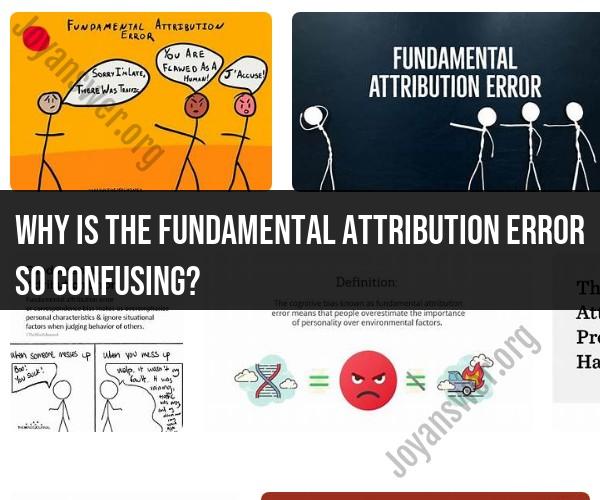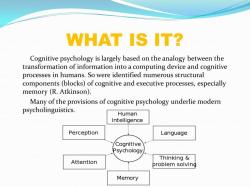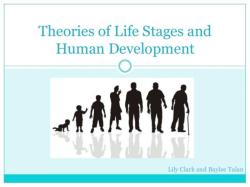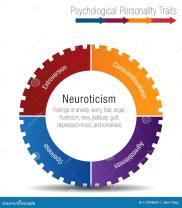Why is the fundamental attribution error so confusing?
The fundamental attribution error (FAE) can be confusing because it represents a cognitive bias that runs counter to our intuitive understanding of how people perceive and explain the behavior of others. This error occurs when people tend to attribute the behavior of others to internal, dispositional factors (e.g., personality or character) while downplaying or ignoring the influence of external, situational factors.
Here are some reasons why the fundamental attribution error can be perplexing:
Contrary to Common Belief: The FAE contradicts the common belief that we are generally rational and objective when assessing the actions of others. It highlights a consistent bias where we tend to focus on internal factors and underestimate the impact of external circumstances.
Overemphasis on Personality: We often assume that a person's behavior reflects their true personality or character, even when there may be significant external factors affecting their actions. This leads to misunderstandings and misjudgments.
Cultural and Situational Variability: The FAE is not consistent across all cultures and situations. It can be more pronounced in individualistic cultures, where personal attributes are highly valued, and less prominent in collectivist cultures, which emphasize group and situational influences.
Complex Social Interactions: Social interactions are incredibly complex, and behavior can be influenced by multiple factors, including personality, situational context, and social norms. Navigating this complexity can make it difficult to pinpoint the exact causes of behavior.
Impact on Relationships: The FAE can lead to misunderstandings, conflicts, and damaged relationships. When people consistently attribute negative behaviors to the other person's character, it can lead to resentment and hostility.
Cognitive Load: People may not always have the mental bandwidth or motivation to consider the numerous situational factors that could influence someone's actions. It's cognitively easier to rely on personality-based explanations.
Lack of Awareness: Many individuals are not aware of the fundamental attribution error and may not recognize when they are making this error in their judgments of others.
Emotional and Moral Judgment: Emotions and moral judgments often come into play when evaluating the behavior of others. We might attribute negative actions to personality flaws more readily, as it aligns with our feelings of moral outrage or frustration.
Understanding and acknowledging the fundamental attribution error is essential for more accurate and empathetic social interactions. By recognizing this bias, we can strive to be more understanding and considerate of the situational factors that may influence people's behavior, leading to better communication and relationships.
The Confounding Nature of Fundamental Attribution Error
The fundamental attribution error (FAE) is a cognitive bias in which we tend to overestimate the influence of dispositional factors (such as personality traits) and underestimate the influence of situational factors (such as the environment) when explaining the behavior of others.
The FAE is a confounding error because it can lead us to make inaccurate judgments about people and their motivations. For example, if we see someone being rude to a waiter, we may be more likely to attribute their behavior to their personality (e.g., they are a mean person) than to the situation (e.g., they are having a bad day or they are stressed out about work).
Why Fundamental Attribution Error Can Be Perplexing
The FAE can be perplexing because it can lead us to make unfair and inaccurate judgments about people. For example, if we see a homeless person begging for money, we may be more likely to blame their situation on their personal choices (e.g., they are lazy or they don't want to work) than on the systemic factors that contribute to homelessness (e.g., lack of affordable housing, poverty, mental illness).
The FAE can also be perplexing because it is so common. Even people who are aware of the FAE can still fall victim to it. This is because the FAE is an automatic cognitive process that is difficult to control.
The Challenge of Recognizing and Addressing Attribution Bias
One of the challenges of recognizing and addressing attribution bias is that it is often unconscious. We may not be aware that we are making biased judgments about people.
Another challenge is that attribution bias can be reinforced by our social environment. For example, if we hear other people making biased judgments about people, we may be more likely to do the same.
Despite these challenges, there are a few things we can do to recognize and address attribution bias:
- Be aware of the FAE and other attribution biases.
- Pay attention to the situational factors that may be influencing people's behavior.
- Be mindful of your own biases and try to challenge them.
- Seek out information from diverse sources to avoid confirmation bias.
Cognitive Dissonance and Fundamental Attribution Error
Cognitive dissonance is a state of tension that occurs when we hold two or more conflicting beliefs or attitudes. When we experience cognitive dissonance, we are motivated to reduce it by changing our beliefs or attitudes, or by finding ways to justify our conflicting beliefs and attitudes.
The FAE can lead to cognitive dissonance because it can cause us to make inaccurate judgments about people's motivations. For example, if we believe that someone is a good person, but we see them doing something bad, we may experience cognitive dissonance. To reduce this dissonance, we may try to justify their behavior (e.g., they were having a bad day) or we may change our judgment about them (e.g., maybe they're not such a good person after all).
Cognitive Psychology Perspectives on the Complexities of FAE
Cognitive psychology perspectives on the FAE focus on the cognitive processes that underlie this bias. For example, one perspective is that the FAE is caused by a tendency to focus on the actor's behavior and to ignore the situational factors that may be influencing their behavior.
Another perspective is that the FAE is caused by a tendency to make inferences about people based on their behavior. This tendency can lead us to overestimate the influence of dispositional factors and underestimate the influence of situational factors.
Cognitive psychology research on the FAE has also shown that this bias can be influenced by a variety of factors, such as our own personality traits, our social environment, and the culture we live in.
Overall, the FAE is a complex cognitive bias that is influenced by a variety of factors. Cognitive psychology research on this bias has helped to shed light on the underlying cognitive processes and to identify the factors that can influence the FAE. This research can be used to develop interventions to help people reduce their attribution bias and make more accurate judgments about people and their motivations.












